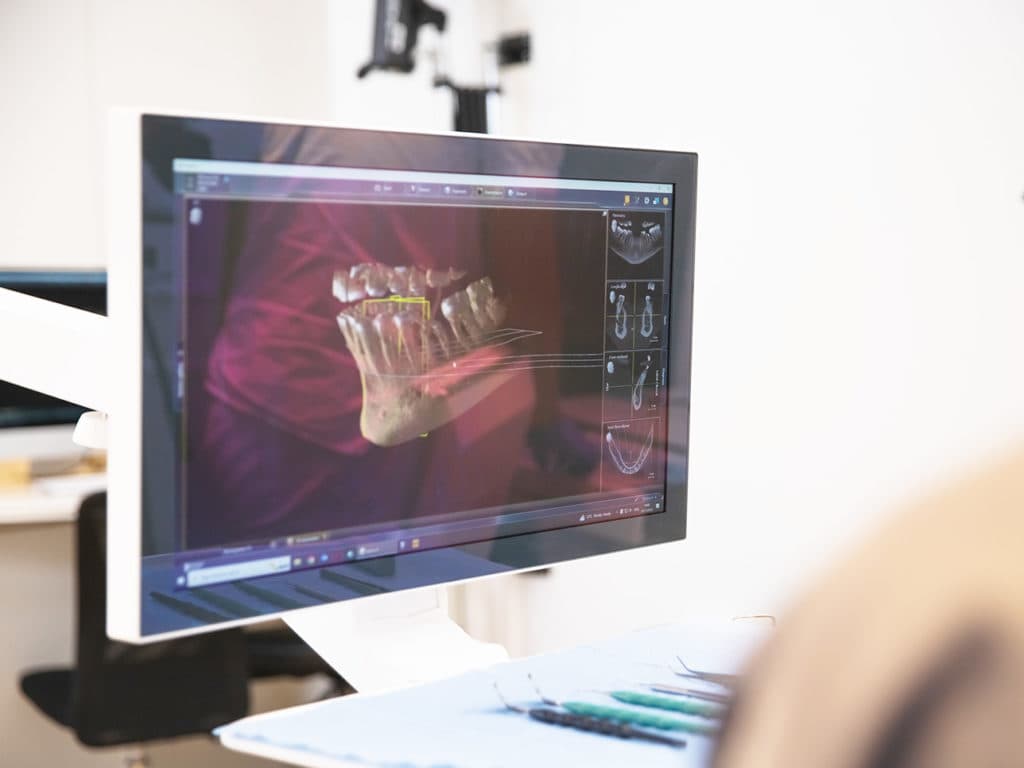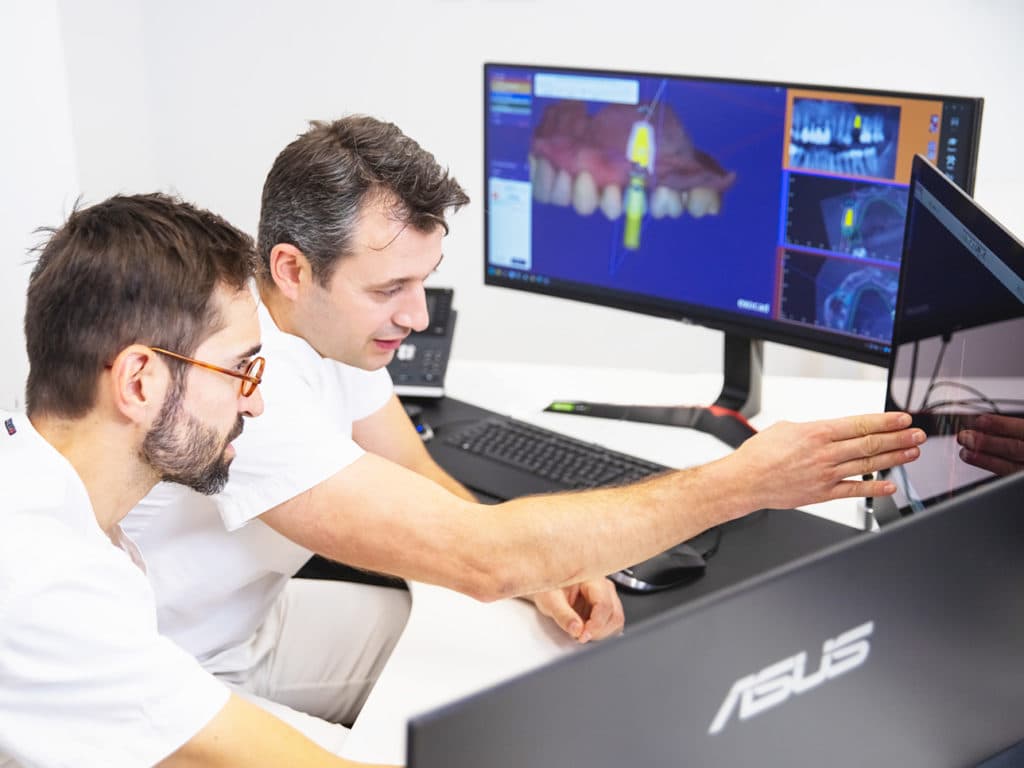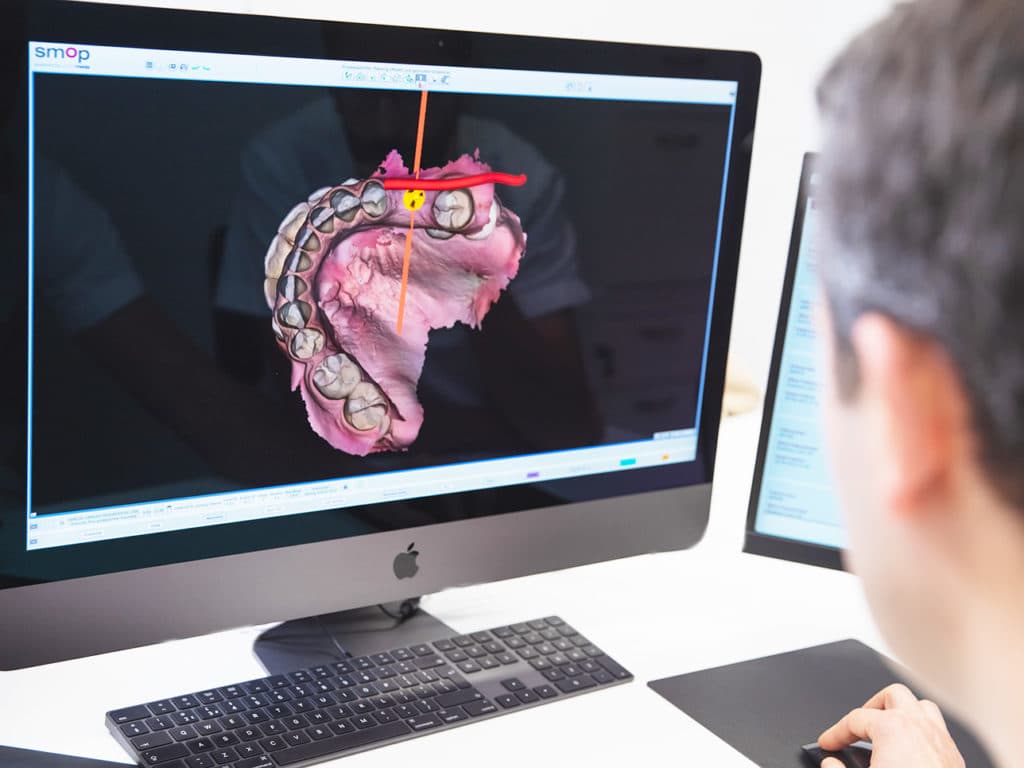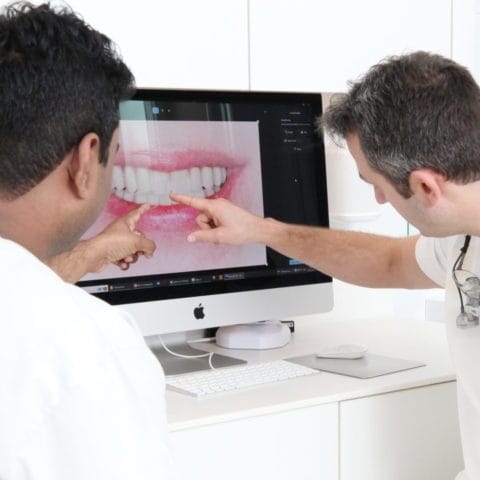Zygomatic Implants in London
Zygomatic implants are particularly long dental implants that are embedded in the cheekbone (medical term: zygomatic bone) when there isn’t enough bone tissue in the upper jaw for normal implants. With zygomatic implants, even seemingly-impossible situations can be solved with fixed teeth.

Treatment Duration
4 hours per jaw

Price
From £25,000

Recovery Time
7+ days

Zygomatic implants are specialised dental implant that is used for patients who don’t have enough bone density or height required for a traditional dental implant. This innovative and relatively new treatment can be used to replace teeth located in the upper jaw and can also be used in conjunction with traditional implants depending on the patient’s circumstance.
When your dentist assesses your suitability for dental implants, they will look for whether there’s enough bone mass for the implants to fuse with. If there is enough bone mass, then they can be confident that over time the dental implants will be structurally sound and fixed to the jaw. However, in some instances patients present with too little bone mass to fuse onto. Traditionally, your dentist might be forced to undertake a procedure called a sinus lift – this is where the bone in between the oral cavity and sinus cavity is artificially thickened to prevent your sinuses from being damaged by the new dental implants and additionally provide more support for the implants. Unfortunately, this often requires the patient to have to undergo this procedure first and then recover before dental implants can be placed.
Zygomatic implants are revolutionary in that rather than needing additional procedures, the dental implants are implanted into the cheekbone (also known as the ‘zygomatic bone’). This provides patients without the necessary bone mass in their jaw, to still have the dental implants fitted but just to a different anchor point.
What happens during zygomatic implant treatment?
- Like all dental implant treatments, we always start with a thorough and robust inspection of your mouth to make an assessment regarding what treatment you’re most suited for. At your initial consultation in our London dental practice, your dentist will talk through your dental hygiene routine and history and then will make a closer inspection of the affected areas you wish to treat.
- We will first make photos, stone plaster models of your teeth and a three-dimensional X-ray (CBCT). This is necessary to accurately determine an implant placement and length. The position of the implants is planned virtually on the computer. The position of the newly designed teeth which are visible in the 3D image serves as an orientation aid. This position is transferred into a drilling template.
- If your dentist feels that zygomatic implants are the best option for you, he/she will then book you in for an appointment to revisit the dental practice. Your dentist will talk you through what happens during the treatment, what you can expect and what you should do before and after the procedure.
- On the day of the treatment, you will arrive at our central London dental clinic where you’ll be greeted by our reception team. Your dental surgeon will confirm you’re happy to have the treatment and are in good health. You will likely receive some sedation to make sure that you’re not in any pain during the treatment.
- The entire procedure can take up to 7 hours which breaks down into 4 hours of treatment, 2 hours in observed recovery and then 1 hour of placing the temporary denture on the same day. The treatment works by fixing a replacement bridge using four dental implants. The zygomatic dental implants are longer in length so they can be surgically anchored to the cheekbone. After the zygomatic implants have been placed, the implant positioning is transferred onto a stone plaster model with an impression.
- Our dental technicians then construct a bridge, which can be screwed onto the new implant. Due to the very solid bone tissue of the zygomatic bone, the implant and the restoration can usually be used straight after the surgery with soft food.
- When the treatment is finished by our implantology specialist, you’ll be asked to wait 1 hour in recovery so we can be sure you’re fine to leave us. Most zygomatic implant procedures can be done on the same day.
Meet your award-winning Zygomatic Implants dentist and team…
- We have over 75+ years of combined dentistry experience across our specialist team.
- 10,000+ treatments performed and counting.
- We are leaders in the dental industry – we regularly teach, lecture and publish our research work internationally.
Our Expertise
Zygomatic implants are a relatively new treatment having only been first undertaken in the 1990s, as such this procedure isn’t often offered widely in the dentistry industry. Reasons, why you should pick Wimpole Street Dental Clinic, include:
Our recently refurbished dental clinic is situated on the prestigious Wimpole Street in the heart of London (the General Dental Council are our neighbours!). Our convenient location makes us ideal for workers in the city and our practice is accessible by car, bus, taxi, or London Underground.
We’ve invested in the latest state-of-the-art dental imaging technology to use 3D images of your mouth to help create the most accurate and comfortable implants.
Our specialist team have decades of combined experience in dental implants and is regularly at the forefront of the latest dental innovations as demonstrated by our extensive experience lecturing, teaching and regularly contributing to scientific research.
Our dental practice not only has its own in-house sedationists but also an expert and highly skilled dental surgeon team specialising in dental implants.

Sophie W
I not only received a solution to my dental problem but also I left with renewed confidence in my smile, all thanks to the wonders of modern dental technology and the skilled hands at Wimpole Street Dental Clinic.
Who is suitable for zygomatic implants?
Zygomatic implants are extra-length dental implants that are anchored to your cheekbone. Your dentist might recommend that you require zygomatic implants if your bone tissue/mass won’t provide a strong enough foundation for traditional dental implants. This is often quite common amongst older patients who have worn removable dentures for a long period of time and might have lost some jawbone mass but still want a dental implant fitting.
Fundamentally, dental implants and zygomatic implants are suitable for dental patients who have lost one or more teeth to damage, disease and/or decay and want to replace the affected teeth with a natural-looking implant.
Your dentist may advise that zygomatic implants are a better choice for you if they feel that you should avoid more traditional methods of resolving low bone density. Procedures such as bone grafting where a bone graft is taken from elsewhere to provide support can require up to six months of recovery time and multiple surgical procedures. Zygomatic implant treatment allows your dentist to avoid this by achieving similar results with just one procedure.
Take your first step with Wimpole Street Dental Clinic
Discover the path to a brighter smile with Wimpole Street Dental Clinic! Our team of skilled professionals utilizes advanced technology to provide personalised dental care in a comfortable setting.





New page design
Written by: Prof Dr Christian Mehl
Medically reviewed by: Dr Raul Costa
Author biography added
Written by: Prof Dr Christian Mehl
Medically reviewed by: Dr Raul Costa
Original content created
Written by: Prof Dr Christian Mehl
Medically reviewed by: Dr Raul Costa
Wimpole St Dental Clinic has strict sourcing guidelines and relies on peer-reviewed studies, academic research institutions, and medical associations. We avoid using tertiary references. You can learn more about how we ensure our content is accurate and current by reading our editorial policy.
- Aparicio C, Manresa C, Francisco K, Claros P, Alández J, González-Martín O, Albrektsson T. Zygomatic implants: indications, techniques and outcomes, and the zygomatic success code. Periodontol 2000. 2014 Oct;66(1):41-58. doi: 10.1111/prd.12038. PMID: 25123760.
- Rawal S, Balshi T, Jivraj S. Restoration of Zygomatic Implants. Atlas Oral Maxillofac Surg Clin North Am. 2021 Sep;29(2):291-299. doi: 10.1016/j.cxom.2021.04.006. Epub 2021 Jun 11. PMID: 34325815.
- Alterman M, Fleissig Y, Casap N. Zygomatic Implants: Placement Considerations in Implant-Supported Maxillary Prosthesis. Atlas Oral Maxillofac Surg Clin North Am. 2021 Sep;29(2):173-183. doi: 10.1016/j.cxom.2021.05.002. Epub 2021 Jul 6. PMID: 34325807.
- Vega LG, Border M. Zygomatic Implants in Combination with Dental Implants. Atlas Oral Maxillofac Surg Clin North Am. 2021 Sep;29(2):233-241. doi: 10.1016/j.cxom.2021.04.002. Epub 2021 Jun 16. PMID: 34325810.







